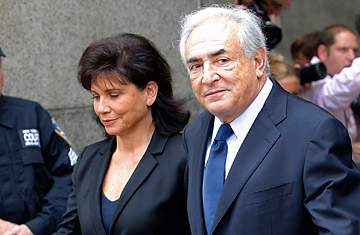
Former IMF Chief Dominique Strauss-Kahn and his wife Anne Sinclair leave Manhattan Criminal Court after Strauss-Kahn's arraignment hearing in New York June 6, 2011.
Can Dominique Strauss-Kahn salvage a future in French politics? Despite his legal problems in the U.S., observers say his most optimistic backers are keeping alive scenarios of their champion somehow extricating himself from the catastrophic turn in his once-brilliant career. "There's currently so much amazement, shock and perplexity over the speed and enormity of DSK's fall that — in the minds of many people — any outcome in such a surreal situation remains possible," says Denis Muzet, president of the Paris-based Institut Mediascopie opinion-research group.
That scenario, as explicated by Muzet — whose firm analyzes public reaction to major political, social and economic issues — is one of redemption. "Supported by a leftist government wanting to use his talents," posits Muzet, "Strauss-Kahn could go to the French public, tell his story, admit his errors and faults, and rebuild his relationship with the French people and win back their confidence. Despite his disgrace, there's a lingering admiration for the leadership qualities that Strauss-Kahn demonstrated while in office."
But there are several very big "Ifs" in all this for the disgraced former chief of the International Monetary Fund. "He'll need to avoid a guilty verdict," says Muzet, "convince a large body of French public opinion he was indeed innocent of the rape charges in New York — and demonstrate he's learned the lessons from that ordeal." Muzet spins out a couple of possibilities: "If Strauss-Kahn were either acquitted or avoids conviction through a financial transaction with the victim that wouldn't run afoul of American laws, he and his defenders could point to the lack of a guilty verdict as proof their claims of innocence had been true all along." On Monday, Strauss-Kahn pleaded "Not Guilty" before a New York judge, denying charges of sexual assault and attempted rape.
Even if Strauss-Kahn can survive his clash with American justice by avoiding a guilty plea bargain or verdict, he would then have to inspire sufficient doubt in French public opinion about what actually happened in the Manhattan Sofitel to offset the damaging allegations that have arisen in France since the incident. Those include stories of Strauss-Kahn's aggressive sexual behavior toward French women, including at least one accusation of attempted rape. "The question then," says Muzet, "would be whether a large enough section of public opinion would feel there was sufficient doubt and confusion surrounding what happened in New York to give Strauss-Kahn benefit of the doubt — and a chance to start over again."
The one fantasy that even die-hard disciples cannot see coming to pass is this: Strauss-Kahn somehow pulling off legal magic in time to participate in France's presidential election in 11 months. Though DSK's New York trial should start before the end of this year, Socialists who want to run in the party's primary next autumn must register by June 26 — a deadline Strauss-Kahn won't even try to meet, even if he feels certain he'll eventually be acquitted. "Values and ethics are going to be central to the 2012 elections, and neither Strauss-Kahn nor the Socialist Party would want anyone involved in any part of that battle who'd attract criticism and accusation about sexual misconduct, much less accusations of rape," Muzet says.
And forget DSK getting a late-entry pass should he be found not guilty after the Socialist primaries. Though polls had long shown Strauss-Kahn favored to win that contest before trouncing incumbent President Nicolas Sarkozy in the general election, Muzet says it's unthinkable that backers of the eventual Socialist candidate (or even those of defeated rivals) would stand by and let DSK step in as party standard-bearer were he to escape a guilty verdict in New York before the first round of polling on April 22, 2012. He will need to keep in the good graces of his fellow Socialists if he hopes to be rehabilitated. "Once the elections are over — and in the event the left comes out of those victorious — there could be an opportunity for Strauss-Kahn to attempt a cautious return to political life," Muzet explains.
But that's what may happen with best-case scenarios. Other observers aren't so sure that DSK's career can be resurrected even with an acquittal or some artfully negotiated settlement to avoid or undermine criminal prosecution (which may not even be legally possible). "I think his political career is probably dead now — even in France," says a French political adviser and strategist. "People have now heard too many anecdotes and accusations of him as a sexual freak to forget them, whether he's found guilty in New York or not."
The French strategist acknowledges that acquittal, the passage of time — and future allegations of beastly behavior by other French leaders —might soften public condemnation of DSK and allow his radioactivity to dim enough to consider a return. But it's at that point, the official predicts, that Strauss-Kahn will feel even harsher condemnation on an issue French public opinion doesn't forgive: violation of class consciousness.
"In addition to his sexual behavior," says the strategist, "the biggest criticism of Strauss-Kahn — especially among leftists — has been that he's got too much money, loves the life of wealth and privilege, and is exactly the kind of caviar Socialist who'd defend working-class voters on the stump before renting a ritzy house in Tribeca when that seemed convenient." He notes, "If the [trial] outcome allows him to fight off the rape charges and survive his reputation as a womanizer, voters and officials in his own leftist camp will never forgive him his crime of having too much money, and using it lavishly on himself. In France, if the battle of the sexes doesn't prevent him from making a comeback, this country's enduring class war will." It is the kind of reverse snobbery that no lawyer can defend against.
